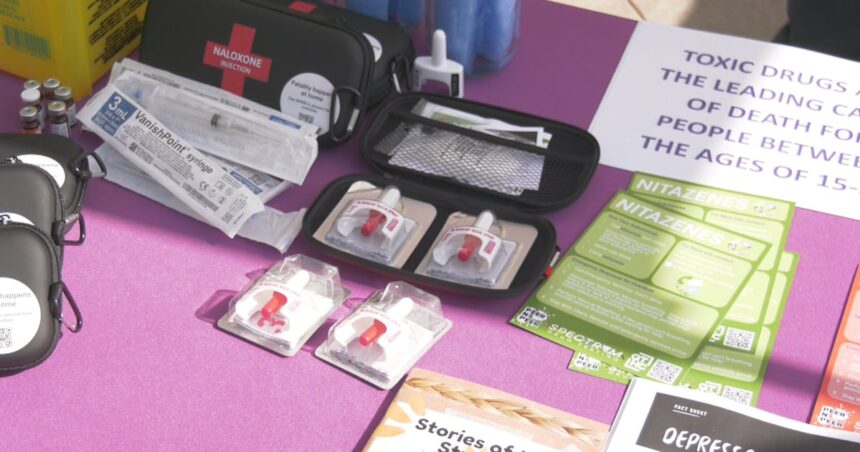Yesterday, I stood among a group of dedicated Edmontonians at the Boyle Street Plaza, witnessing something both heartbreaking and hopeful. The Harm Reduction Society of Edmonton hosted a drop-in event focused on overdose education and awareness, bringing together those affected by the ongoing crisis that has claimed too many lives in our city.
The afternoon air was crisp as I watched volunteers carefully arrange naloxone kits on tables. These small packages, containing medication that can reverse opioid overdoses, have become tragically commonplace in Edmonton. But what struck me most wasn’t the supplies—it was the stories being shared.
“Education is key to saving lives,” explained Petra Schulz, co-founder of Moms Stop The Harm. “Many people don’t realize that anyone can administer naloxone. You don’t need special training to help someone who’s overdosing.”
Schulz, who lost her son Danny to an accidental fentanyl overdose in 2014, spoke with the quiet authority of someone who has transformed personal tragedy into public advocacy. Her organization supports families impacted by substance-related harms and deaths while advocating for policy changes.
The event created a judgment-free space where attendees could learn overdose response techniques, access resources, and connect with support services. For many participants, this was their first introduction to harm reduction principles.
“It’s really hard to stay on top of it,” said Jason Thompson, a frontline harm reduction worker. “The drug supply changes constantly, becoming more unpredictable and dangerous. People need to know what they’re dealing with.”
Edmonton’s overdose crisis reflects a troubling provincial trend. Alberta Health Services reported 179 opioid-related deaths in Edmonton during the first quarter of 2023 alone, a 12 percent increase from the same period last year.
As I moved through the crowd, I met Sarah, who didn’t want her last name published. She lost her brother six months ago and came seeking understanding.
“I wish I’d known the signs,” she told me, eyes glistening. “Maybe I could have helped him if I’d recognized what was happening.”
Her experience echoes what many families face—the painful combination of grief and what-ifs that follow an overdose death.
Beyond naloxone training, attendees could access drug checking services that help identify potentially dangerous substances. These services have become increasingly important as fentanyl and other potent synthetic opioids contaminate the drug supply.
“People aren’t trying to die,” explained Dr. Elaine Hyshka, assistant professor of public health at the University of Alberta. “Most overdoses happen because someone doesn’t know what’s in their drugs or how potent they are. Drug checking gives people information to make safer choices.”
The event also highlighted community-based initiatives working to fill gaps in the system. The Edmonton Street Outreach Collective distributed care packages containing socks, granola bars, and resource information alongside harm reduction supplies.
What made this gathering different from typical health outreach was its emphasis on dignity and compassion. Speakers consistently emphasized that substance use disorders are health conditions, not moral failings.
“The shame and stigma kill people,” said Thompson. “When we make people feel judged for addiction, they use alone, and that’s when overdoses become fatal.”
As the afternoon progressed, a memorial wall grew with photos and messages honoring those lost to overdoses. The faces—young and old, from all walks of life—served as a stark reminder that this crisis touches every corner of our community.
City councillor Anne Stevenson, who attended briefly, emphasized the need for multiple approaches. “We need prevention, treatment, and harm reduction working together. No single strategy will solve this crisis.”
The event concluded with a candlelight vigil, where names were read aloud in remembrance. The flickering lights created a moment of solidarity among strangers united by shared concern for their community.
Walking away from the plaza, I reflected on how events like these represent the best of Edmonton—people coming together to protect their neighbors with practical compassion and without judgment.
For those seeking support or information about harm reduction services in Edmonton, the Streetworks program offers resources and naloxone training. The Alberta Health Services Addiction Helpline also provides 24/7 confidential support at 1-866-332-2322.
In a crisis that can often feel overwhelming, yesterday’s gathering reminded us that education, compassion, and community action remain our strongest tools against the tide of overdose deaths in Edmonton.







